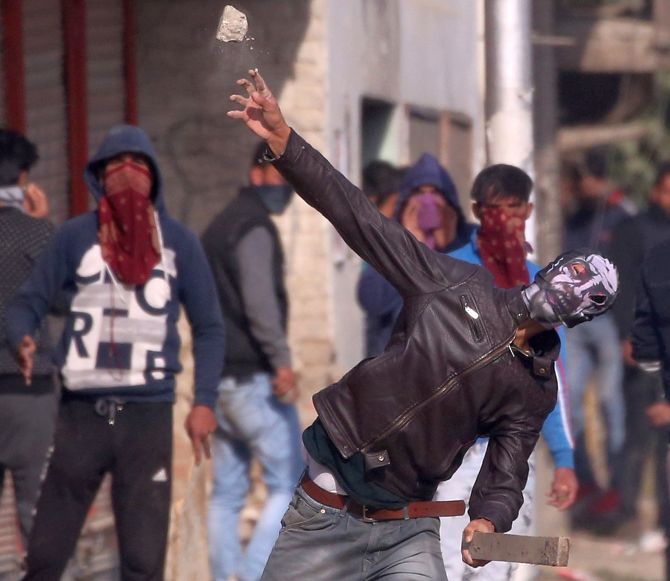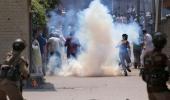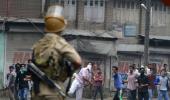Political engagement is essential in the Valley, but not just to capture power, observes Ajai Shukla.

Last fortnight, I spent four days in Kashmir reading the mood among youngsters there. Engaging the Kashmiri youth is critical. With the decline of the Joint Resistance Leadership -- largely the outmoded separatists of the Hurriyat Conference -- a fragmented and highly localised youth leadership now guides confrontation with the security forces.
Speaking to youths, especially in the roiling districts of south Kashmir, it becomes evident that the longstanding Kashmiri tradition of anger at mainstream India has turned into bubbling, visceral hatred. Almost every Kashmiri will argue that the flagrant anti-Muslim bias of the Narendra Modi government has validated the two-nation theory, leaving Muslims with no place in today’s India.
Person after person recounted mistreatment and abuse by security forces, especially at random check-posts that treat every Kashmiri as a terrorist until proven innocent.
There was the grinding misery of random inconvenience: Traffic being halted for hours to clear the road for security force convoys, youngsters being detained at military camps or police stations, purely for the mistake of being a young, fighting-age male.
So deep-flowing is the vein of Kashmiri bitterness that even the rising epidemic of drug addiction is blamed on an “Indian plot” to plant a cancer that destroys the flower of Kashmiri youth. Youngster after youngster swore to me that Kashmiris would fight to the finish in their struggle for azaadi.
However, long-time watchers of the Valley understand, and factor into their judgement, the Kashmiris’ deep-felt need to vent anger. The first half of any conversation is different from the second half, which is far more coloured with pragmatism, even wisdom.
It became quickly evident that the Kashmiris realise they are at a fork in the road -- one path paved with continued violence, uncertainty and security force operations; the other characterised by dialogue and calm.
Everyone realises the start of dialogue does not mean a full end to violence. But the emphasis will shift from confrontation to reconciliation. The Kashmiris are amenable to a dialogue outreach from New Delhi; but the government is keeping its cards close to its chest.
It is hard to miss the fatigue among Kashmiris, notwithstanding brave words about “a new generation having lost its fear of death”.
Since Kashmir went up in flames in mid-2016 with the killing of Burhan Wani -- a novice militant whose charisma made him a social media icon among Kashmiri youngsters -- New Delhi has engaged Kashmir exclusively through the medium of security force operations.
New Delhi’s strategy -- often referred to as the Doval Doctrine, after National Security Advisor Ajit Doval -- rests on the belief that Kashmiris have been pampered for decades (including by Atal Bihari Vajpayee’s Bharatiya Janata Party government) and that they needed a robust reminder that New Delhi had hard options as well.
Towards this, the Union government has squeezed the separatists on the simultaneous fronts of counter-militancy operations, economic targeting of separatist finances and incarceration of the separatist leadership. Syed Ali Shah Geelani and Mirwaiz Umar Farooq are mostly under house arrest, while Yasin Malik and Shabir Shah have been consigned to jail.
Mainstream politics too has ground to a standstill, with Mehbooba Mufti’s government dismissed and governor’s rule imposed for the foreseeable future. Omar Abdullah’s National Conference is unlikely to be spared either. The administration is in the hands of J-K Governor Satya Pal Malik, who has a well-deserved reputation for breath-taking faux pas.
Recently, Malik urged militants to kill “the corrupt people who have looted Kashmir”, instead of killing innocents such as police officers. Facing accusations of endangering mainstream politicians and bureaucrats, Malik has clarified that he spoke in his individual capacity, not as governor.
If there is fatigue among the Kashmir public, the security forces must also be feeling like they are running up a down-coming escalator. J-K police violence statistics for the last decade starkly illustrate the lost opportunity for initiating political dialogue in 2013-15, when the violent street uprisings of 2008-10 had cooled, tourism was booming and there were just 150 active militants in Kashmir.
Instead, the Bharatiya Janata Party-led government’s majoritarian agenda drove Kashmir back into alienation.
After Burhan Wani’s death in mid-2016, the flames have only leapt higher. The security forces kill a growing number of terrorists each year at a growing cost to themselves. Worse, from 2009-12, more than three terrorists were killed for each dead soldier.
Since 2016, the cost in blood has almost doubled. If these troubling violence figures are to be mitigated, a fresh political engagement of Kashmir is essential.
While little is yet conclusive, it appears there might be one in the offing. Home Minister Amit Shah visited Kashmir last month and addressed the panchayat (local government) heads elected in December.
Recently, Defence Minister Rajnath Singh declared that Kashmir would be resolved soon and “no power on Earth can stop it”. Quickly tamping down on any optimism, he added: “If not through talks, then we know another way too.”
Meanwhile, sources in Srinagar say the prime minister’s office has intensified the monitoring of the economic schemes it initiated -- also pointing to elections.
Kashmiri political leaders believe the BJP is kick-starting politics towards a clear end: Forming a BJP-led government in Kashmir, which can lead the way to abrogating Articles 35A and 370 of the Constitution.
Kashmiri politicians and security managers are wary about such a plan, warning that any political erosion of Kashmiri identity markers would constitute a red line that should preferably not be challenged. Mufti has already stated that, if Article 35A is challenged, “There will be no one left to hold [the national flag in Kashmir].”
However, the BJP apparently believes that a political majority and an enhanced security presence to control the reactions would allow it to ram through the changes.
Obtaining a political majority involves sweeping the 37 seats in Jammu and two of the four in Ladakh through a polarising electoral agenda; and winning a handful of seats in Kashmir to achieve a majority in the 87-seat J-K assembly.
The Kashmiri seats can only be achieved by fragmenting Abdullah’s National Conference and Mufti’s People’s Democratic Party, while simultaneously tying up with smaller Kashmiri players like Engineer Sheikh Abdul Rashid, Sajjad Lone and former Indian Administrative Service officer, Shah Faesal.
Without a dialogue aimed at engaging and co-opting the separatist hard core, such political machinations are likely to only discredit New Delhi further.
Alongside a reconciliation dialogue, the government must also actively facilitate Kashmiri youth to move out of the state into mainstream India, providing visible alternatives even for those who stay back.
The north-eastern states, once riven with insurgencies, are being steadily assimilated as large numbers of their youngsters find jobs in service industries in mainstream India.
It would be useful to facilitate such a path for Kashmir’s youngsters as well.











